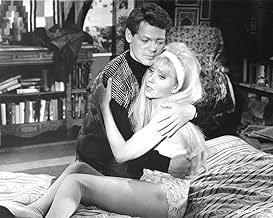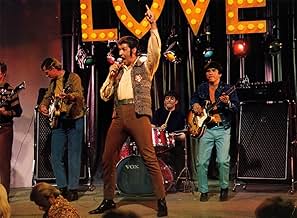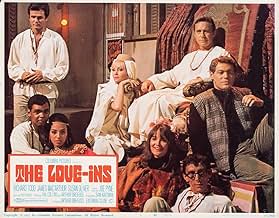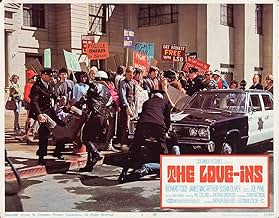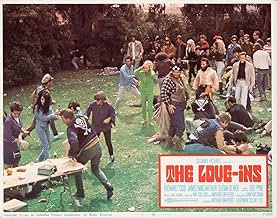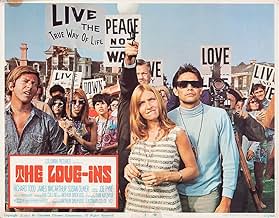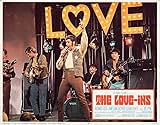Ajouter une intrigue dans votre langueA college professor resigns in protest to the dismissal of student underground newspaper workers and later joins their "hippie movement" and becomes their "Messiah."A college professor resigns in protest to the dismissal of student underground newspaper workers and later joins their "hippie movement" and becomes their "Messiah."A college professor resigns in protest to the dismissal of student underground newspaper workers and later joins their "hippie movement" and becomes their "Messiah."
- Réalisation
- Scénario
- Casting principal
- Lamelle
- (as Janeé Michelle)
- Mr. Henning
- (as James Lloyd)
Avis à la une
But his acting persona and style had fallen out of favour by the mid-1960s as kitchen-sink dramas and 'Swinging London' type films became popular. The drying up of roles perhaps disorientated him as that's the only way one can explain his appearance in the American film 'The Love-Ins'.
The film is a cheap and tedious take on the counter-culture sweeping America at the time. What is surprising is for an exploitation picture, apart from an 'Alice In Wonderland' LSD sequence, it's not even entertaining as camp.
But the film's most dispiriting aspect is Todd's performance. In the central role of playing a supposedly Timothy Leary-like figure that captures the hearts and minds of San Francisco youth, Todd is totally unconvincing and displays none of the charisma or personality such a role required. His inability to even attempt to adjust his usual acting style just underlines how miscast he is.
In a career with many quality films and performances, this is a sad career low.
Counterculture garbage from producer Sam Katzman and director Arthur Dreifuss.
Bad trip, man.
Bummer.
* The Love-Ins (1967) Arthur Dreifuss ~ Richard Todd, James MacArthur, Susan Oliver
Still, the one dimensional, stereotypical characters: hypocritical, "square" parents clashing with reckless, self-absorbed young adults, intolerant jocks, a greedy promoter and a cult leader with a messiah complex combined with the "it's all fun and games until someone gets hurt" plot line (and subplots), will have you flashing back to the classic TV series.
That said, this film does have some historic, and even artistic, value as it retells the age old tale of an idealistic movement falling prey to pride and corruption.
When the story begins, a group of students are being expelled from a university for producing an underground newspaper. One of the professors, the 'cool' Dr. Jonathan Barnett (Richard Todd) quits in sympathy over the overreaction of the school and soon he finds himself a minor celebrity...adored by the hippies. After appearing on "The Joe Pyne Show" (sort of like "The Morton Downey Jr Show"), he moves to San Francisco and he moves in to a flat occupied by 147 people and some of his old students.
At first, he's more an observer of the Haight-Ashbury scene, but soon (too soon really) he's a cult leader...wearing white robes and with students sitting at his feet and waiting for him to dispense knowledge...which is mostly about liberation and LSD use. To say he has delusions of godhood is pretty much on point. After one of these old student (Susan Oliver) has a bad Acid trip, the other student (James MacArthur) becomes very suddenly jaded and realizes that Barnett and the drugs are awful. This change, like the change in Barnett, is way too fast to be realistic. So what's next for these folks? Tune in and see....or not.
There are quite a few problems with this film, even if it is an interesting window into a certain subculture of the late 60s (led by Professor Timothy Leary). First, many of Barnett's teen and early 20s disciples are quite old and very square (such as Mark Goddard (31), James MacArthur (30) and Susan Oliver (35))....and becausse of this, they are ridiculous and come off as phonies. Second, the music in the film is pretty awful....or at least much of it. Several times, it seems as if a dozen folks with no musical abilities just started performing their own personal song! Third, and most importantly, the film is chock full of one-dimensional characters. There is no middle ground between the ultra-squares and the hippies most of the film. And, folks go from loving Barnett to hating him almost instantly!
What I did appreciate about the film was how it unknowingly actually predicted the dark side of this 'Summer of Love'.....showing the dark side of the hippie movement. However, it also wasn't exactly subtle nor realistic....and seemed to say that hippies were bad...which is a gross over-generalization.
Overall, the film is interesting from a cultural sense but also imbalanced and phony as well. Please don't, like my daughter, assume all the late 60s was like THIS! Some of this is quite realistic....and much of it isn't.
Le saviez-vous
- AnecdotesThe term "love-in" was one of many co-optings of Timothy Leary's famous mantra "Tune in, turn on, drop out", which gave rise to the original San Francisco "be-in" gatherings of 1967, a pun on the word "being". Another example is a "sit-in" protest, or John Lennon and Yoko Ono's public "lie-ins" from their hotel beds.
- Citations
Dr. Jonathan Barnett: You know, when I heard Larry use the words "a friend", "someone who understands you", I didn't realize he was introducing me. I was expecting to see the Chief of Police. Not that I'm putting down the Establishment, I wouldn't do that for the world. After all, do they tell us what we should believe? No, of course not. I'd even go on record and say they don't care what your beliefs are - providing they don't conflict with theirs.
Dr. Jonathan Barnett: [he continues] And yet, we of the Western world are supposed to be free people. Free to live as we want; free to love as we want; free to dress as we want. But are we given these freedoms? No, of course not. Society wants us to conform to a pattern which would make us all become vegetable. We must not let this happen. We must not conform. And we will definitely not become vegetable!
Dr. Jonathan Barnett: [he continues] The Establishment has left us a world full of strife, prejudice and avarice, not unlike the Roman Empire before its decline. Yet all the legions of Tiberius, Caligula and Nero could not still the ringing truths of the underground voice of those great dissenters, the early Christians. Nor could the voices of Moses, Buddha or Muhammad be stilled, so be it. And we shall not be stilled. We shall not be stilled, for we know the answer. We know that, with the world the way it is in today, we must love. We must share. We must not harbor any bitterness nor practice any violence. Thou shalt not kill. Thou shalt love they neighbor.
- ConnexionsReferenced in Kain's Quest: On Deadly Ground (2016)
Meilleurs choix
Détails
- Durée
- 1h 31min(91 min)
- Rapport de forme
- 1.85 : 1

